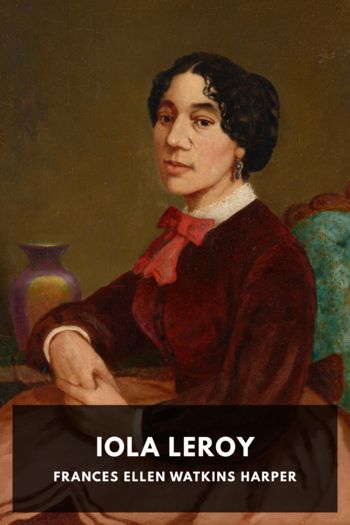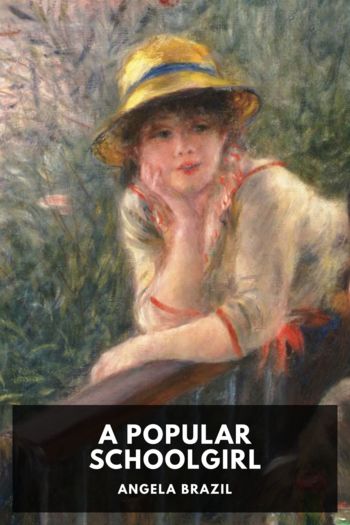Iola Leroy, Frances Ellen Watkins Harper [read aloud books .txt] 📗

- Author: Frances Ellen Watkins Harper
Book online «Iola Leroy, Frances Ellen Watkins Harper [read aloud books .txt] 📗». Author Frances Ellen Watkins Harper
“Well, Uncle Daniel,” said Robert, turning the conversation toward him, “you and Uncle Ben wouldn’t go with us, but you came out all right at last.”
“Yes, indeed,” said Aunt Linda, “Ben got inter a stream of luck. Arter freedom com’d, de people had a heap of fath in Ben; an’ wen dey wanted someone to go ter Congress dey jist voted for Ben ter go. An’ he went, too. An’ wen Salters went to Washin’ton to git his pension, who should he see dere wid dem big men but our Ben, lookin’ jist as big as any ob dem.”
“An’ it did my ole eyes good jist ter see it,” broke in Salters; “if I couldn’t go dere myself, I war mighty glad to see someone ob my people dat could. I felt like de boy who, wen somebody said he war gwine to slap off his face, said, ‘Yer kin slap off my face, but I’se got a big brudder, an’ you can’t slap off his face.’ I went to see him ’fore I lef, and he war jist de same as he war wen we war boys togedder. He hadn’t got de big head a bit.”
“I reckon Mirandy war mighty sorry she didn’t stay wid him. I know I should be,” said Aunt Linda.
“Uncle Daniel,” asked Robert, “are you still preaching?”
“Yes, chile, I’se still firing off de Gospel gun.”
“I hear some of the Northern folks are down here teaching theology, that is, teaching young men how to preach. Why don’t you study theology?”
“Look a yere, boy, I’se been a preachin’ dese thirty years, an’ you come yere a tellin’ me ’bout studying yore ologies. I larn’d my ’ology at de foot ob de cross. You bin dar?”
“Dear Uncle Daniel,” said Iola, “the moral aspect of the nation would be changed if it would learn at the same cross to subordinate the spirit of caste to the spirit of Christ.”
“Does yer ’member Miss Nancy’s Harriet,” asked Aunt Linda, “dat she sole away kase she wouldn’t let her whip her? Well, we think dis is Harriet’s gran’chile. She war sole away from her mar, an’ now she’s a lookin’ fer her.”
“Well, I hopes she may fine her,” replied Salters. “I war sole ’way from my mammy wen I war eighteen mont’s ole, an’ I wouldn’t know her now from a bunch ob turnips.”
“I,” said Iola, “am on my way South seeking for my mother, and I shall not give up until I find her.”
“Come,” said Aunt Linda, “we mustn’t stan’ yer talkin’, or de grub’ll git cole. Come, frens, sit down, an’ eat some ob my pore supper.”
Aunt Linda sat at the table in such a flutter of excitement that she could hardly eat, but she gazed with intense satisfaction on her guests. Robert sat on her right hand, contrasting Aunt Linda’s pleasant situation with the old days in Mrs. Johnson’s kitchen, where he had played his pranks upon her, and told her the news of the war.
Over Iola there stole a spirit of restfulness. There was something so motherly in Aunt Linda’s manner that it seemed to recall the bright, sunshiny days when she used to nestle in Mam Liza’s arms, in her own happy home. The conversation was full of army reminiscences and recollections of the days of slavery. Uncle Daniel was much interested, and, as they rose from the table, exclaimed:—
“Robby, seein’ yer an’ hearin’ yer talk, almos’ puts new springs inter me. I feel ’mos’ like I war gittin’ younger.”
After the supper, Salters and his guests returned to the front room, which Aunt Linda regarded with so much pride, and on which she bestowed so much care.
“Well, Captin,” said Salters, “I neber ’spected ter see you agin. Do you know de las’ time I seed yer? Well, you war on a stretcher, an’ four ob us war carryin’ you ter de hospital. War you much hurt?
“No,” replied Robert, “it was only a flesh wound; and this young lady nursed me so carefully that I soon got over it.”
“Is dat de way you foun’ her?”
“Yes, Andrews,”—
“Salters, ef you please,” interrupted Salters. “I’se only Andrews wen I gits my money.”
“Well, Salters,” continued Robert, “our freedom was a costly thing. Did you know that Captain Sybil was killed in one of the last battles of the war? These young chaps, who are taking it so easy, don’t know the hardships through which we older ones passed. But all the battles are not fought, nor all the victories won. The colored man has escaped from one slavery, and I don’t want him to fall into another. I want the young folks to keep their brains clear, and their right arms strong, to fight the battles of life manfully, and take their places alongside of every other people in this country. And I cannot see what is to hinder them if they get a chance.”
“I don’t nuther,” said Salters. “I don’t see dat dey drinks any more dan anybody else, nor dat dere is any meanness or debilment dat a black man kin do dat a white man can’t keep step wid him.”
“Yes,” assented Robert, “but while a white man is stealing a thousand dollars, a black man is getting into trouble taking a few chickens.”
“All that may be true,” said Iola, “but there are some things a white man can do that we cannot afford to do.”
“I beliebs eberybody, Norf and Souf, is lookin’ at us; an’ some ob dem ain’t got no good blood fer us, nohow you fix it,” said Salters.
“I specs cullud folks mus’ hab done somethin’,” interposed Aunt Linda.
“O, nonsense,” said Robert. “I don’t think they are any worse





Comments (0)